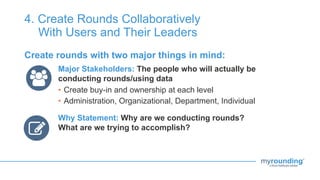Maximize Your Return on Rounding Webinar
- 2. Agenda 1. Connect to Purpose 2. Get Top Down Support 3. Set a Target Start Date 4. Create Rounds Collaboratively 5. Identify Common Issue Types 6. Define Process to Resolve Issues 7. Train 8. Reward and Reinforce 9. Use Data to Make Decisions 10. Review Rounding Template, Iterate, and Improve
- 3. Presenters Michael Niederhauser | MyRounding | VP of Customer Experience Michael honed his information technology and change management skills with Accenture in Washington, D.C. He spent 10 years with a rural health non-profit bringing leading edge patient centered technology and education to underserved communities. Michael is also extremely proud of his service in the U.S. Peace Corps where he taught secondary math and conducted HIV / Malaria awareness programs. Steve Bachtel | MyRounding | Chief Commercial Officer Steve has been consulting with health systems, hospitals, and physician’s groups for almost 20 years. Steve’s expertise includes leveraging outcomes to drive patient volume, perfect culture and process to improve patient experience, and engage patient populations pre-, point-, and post-care. Steve’s professional and graduate research work has prepared him to be a thought leader in the healthcare technology space. Katie Anthony | MyRounding | Marketing Coordinator (Host) Katie has a wide background of marketing expertise including graphic design, campaign strategy, and event planning. For the past five years she has specialized in the healthcare and technology fields working with clients like MGMA, Studer Group, and Hewlett Packard.
- 5. 1. Connect to Purpose • Who • Patients • Employees • What • What are their motives? • What are we trying to do for them?
- 7. 2. Top Down Support • Tough to manage from the middle, but it’s possible • Get results from your position down • Spread those results to encourage site wide adoption • Hard to sustain without help from the top
- 8. 3.Set a Target Start Date
- 9. 3. Set a Target Start Date Setting a timeline holds people accountable
- 10. 4. Create Rounds Collaboratively With Users and Their Leaders
- 11. 4. Create Rounds Collaboratively With Users and Their Leaders Create rounds with two major things in mind: Major Stakeholders: The people who will actually be conducting rounds/using data • Create buy-in and ownership at each level • Administration, Organizational, Department, Individual Why Statement: Why are we conducting rounds? What are we trying to accomplish?
- 13. 5. Identify Common Issue Types • Identify themes from existing issues • Examples: • Patient: FNS, EVS • Staff: Equipment, People
- 14. 6.Define Process to Resolve Issues
- 15. 6. Define Process to Resolve Issues Define: • Current process(es) • Missing process(es) • Follow-up process
- 16. 7.Train
- 17. 7. Train • Pair top performers with those showing promise • Laggards will take more work but will love having a tool/process • Make your training/ initiatives last over time • Connect to the Why
- 19. 8. Reward and Reinforce • If you want something to last, people have to get something out of it • Show them results: they’re making a difference! • Reinforce good behaviors, strengthen others
- 20. 9.Use Data to Make Decisions
- 21. 9. Use Data to Make Decisions • Be proactive with data • Find common issues • React in real time
- 22. 10. Review Rounding Template, Iterate, and Improve
- 23. 10. Review Rounding Template, Iterate, and Improve • Review monthly, evolve templates/questions • Keep your sacred questions • Maintain stakeholder engagement but still move quickly
- 24. Thank you. • Additional questions? Email us at info@myrounding.com • Want a copy of this presentation or webinar recording? Visit www.slideshare.net/MyRounding • Join us next month for our webinar: “High Reliability in Healthcare” Register at www.myrounding.com/high-reliability-organization-webinar























